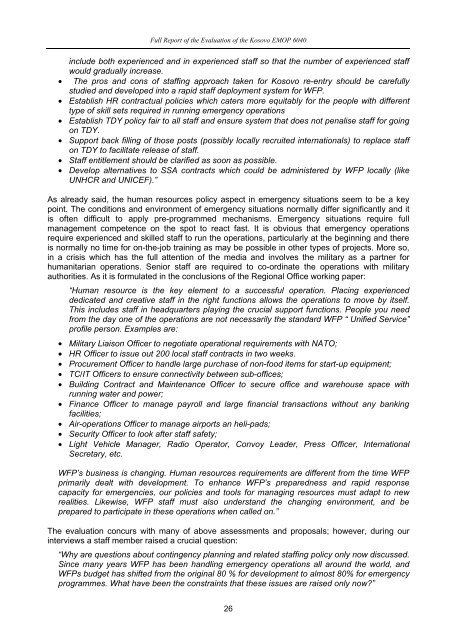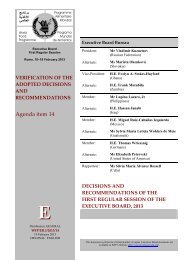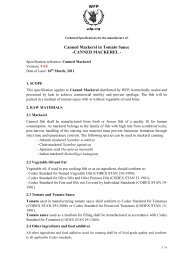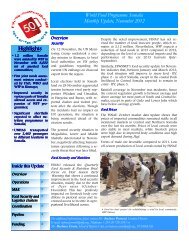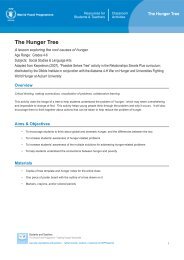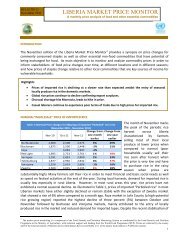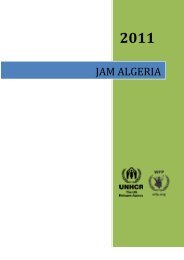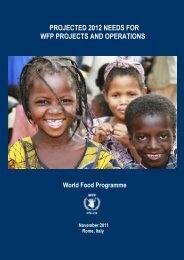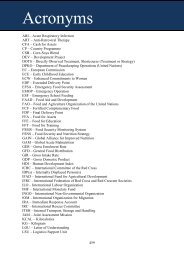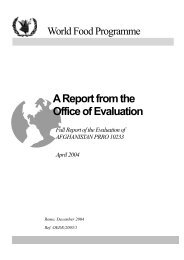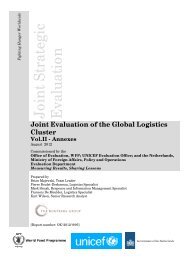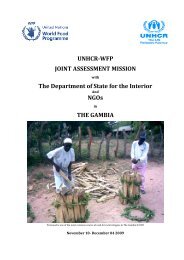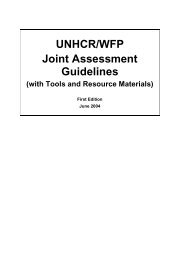Full Report - WFP Remote Access Secure Services
Full Report - WFP Remote Access Secure Services
Full Report - WFP Remote Access Secure Services
You also want an ePaper? Increase the reach of your titles
YUMPU automatically turns print PDFs into web optimized ePapers that Google loves.
<strong>Full</strong> <strong>Report</strong> of the Evaluation of the Kosovo EMOP 6040<br />
include both experienced and in experienced staff so that the number of experienced staff<br />
would gradually increase.<br />
• The pros and cons of staffing approach taken for Kosovo re-entry should be carefully<br />
studied and developed into a rapid staff deployment system for <strong>WFP</strong>.<br />
• Establish HR contractual policies which caters more equitably for the people with different<br />
type of skill sets required in running emergency operations<br />
• Establish TDY policy fair to all staff and ensure system that does not penalise staff for going<br />
on TDY.<br />
• Support back filling of those posts (possibly locally recruited internationals) to replace staff<br />
on TDY to facilitate release of staff.<br />
• Staff entitlement should be clarified as soon as possible.<br />
• Develop alternatives to SSA contracts which could be administered by <strong>WFP</strong> locally (like<br />
UNHCR and UNICEF).”<br />
As already said, the human resources policy aspect in emergency situations seem to be a key<br />
point. The conditions and environment of emergency situations normally differ significantly and it<br />
is often difficult to apply pre-programmed mechanisms. Emergency situations require full<br />
management competence on the spot to react fast. It is obvious that emergency operations<br />
require experienced and skilled staff to run the operations, particularly at the beginning and there<br />
is normally no time for on-the-job training as may be possible in other types of projects. More so,<br />
in a crisis which has the full attention of the media and involves the military as a partner for<br />
humanitarian operations. Senior staff are required to co-ordinate the operations with military<br />
authorities. As it is formulated in the conclusions of the Regional Office working paper:<br />
“Human resource is the key element to a successful operation. Placing experienced<br />
dedicated and creative staff in the right functions allows the operations to move by itself.<br />
This includes staff in headquarters playing the crucial support functions. People you need<br />
from the day one of the operations are not necessarily the standard <strong>WFP</strong> “ Unified Service”<br />
profile person. Examples are:<br />
• Military Liaison Officer to negotiate operational requirements with NATO;<br />
• HR Officer to issue out 200 local staff contracts in two weeks.<br />
• Procurement Officer to handle large purchase of non-food items for start-up equipment;<br />
• TC/IT Officers to ensure connectivity between sub-offices;<br />
• Building Contract and Maintenance Officer to secure office and warehouse space with<br />
running water and power;<br />
• Finance Officer to manage payroll and large financial transactions without any banking<br />
facilities;<br />
• Air-operations Officer to manage airports an heli-pads;<br />
• Security Officer to look after staff safety;<br />
• Light Vehicle Manager, Radio Operator, Convoy Leader, Press Officer, International<br />
Secretary, etc.<br />
<strong>WFP</strong>’s business is changing. Human resources requirements are different from the time <strong>WFP</strong><br />
primarily dealt with development. To enhance <strong>WFP</strong>’s preparedness and rapid response<br />
capacity for emergencies, our policies and tools for managing resources must adapt to new<br />
realities. Likewise, <strong>WFP</strong> staff must also understand the changing environment, and be<br />
prepared to participate in these operations when called on.”<br />
The evaluation concurs with many of above assessments and proposals; however, during our<br />
interviews a staff member raised a crucial question:<br />
“Why are questions about contingency planning and related staffing policy only now discussed.<br />
Since many years <strong>WFP</strong> has been handling emergency operations all around the world, and<br />
<strong>WFP</strong>s budget has shifted from the original 80 % for development to almost 80% for emergency<br />
programmes. What have been the constraints that these issues are raised only now?”<br />
26


